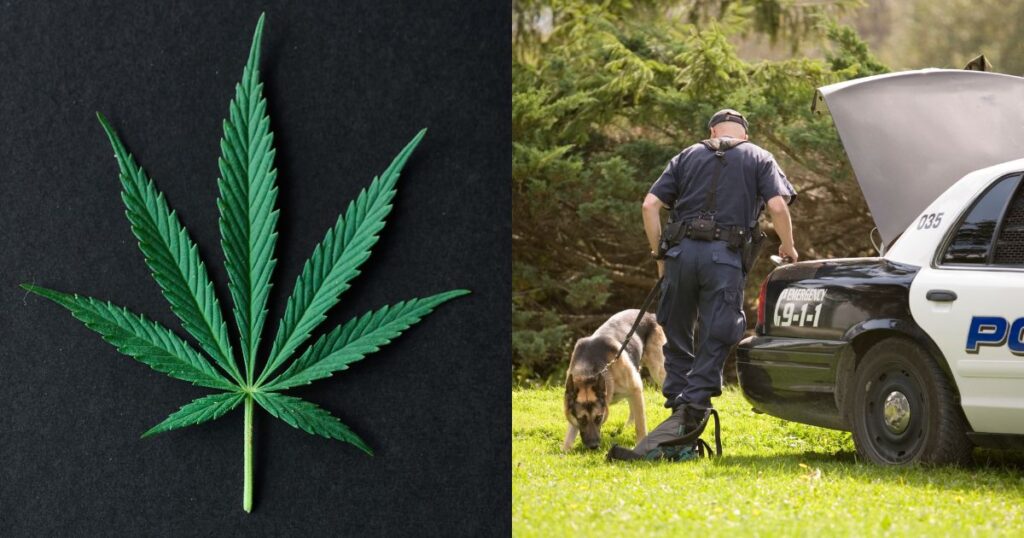Cannabis reform has taken massive strides across the United States over the last decade, with Illinois firmly positioning itself as a pioneer in the legal marijuana industry. But legislative progress inevitably leaves room for growing pains, and Illinois finds itself grappling with a legal gray area that critics claim enables unnecessary and often discriminatory traffic stops.
Senate Bill 42 (SB 42) aims to address an issue lingering in the state’s legal cannabis landscape since 2020, when cannabis was legalized for adult recreational use. The bill, which has already passed the Senate last month, proposes blocking police from using the smell of cannabis, raw or burnt, as justification to stop or search a vehicle.
Clearing Up Confusion in Illinois Cannabis Policing
Illinois’ cannabis policies, though progressive, have created contradictions in law enforcement. The state’s Supreme Court has rendered conflicting opinions on cannabis odor. While a 2024 ruling declared the smell of burnt cannabis insufficient for probable cause to justify vehicle searches, a separate decision ruled that the smell of raw cannabis could warrant a search. The inconsistency lies within the existing law, which mandates that cannabis be stored in odor-proof containers when transported in vehicles.
SB 42 seeks to eliminate this discrepancy by removing the odor-proof container requirement and simultaneously barring officers from initiating a stop or search based solely on the smell of cannabis. Leading the charge is Senator Rachel Ventura, who sponsored the bill with the intention of modernizing Illinois’ cannabis framework and reducing subjective interpretations of legal cannabis use. Furthermore, the proposed bill reflects the undeniable reality that cannabis odor alone no longer signifies illegal behavior in a state where its use is widely accepted and regulated.
One of the most compelling arguments in favor of SB 42 is its potential to curb racially biased policing practices. For years, authorities have used the “smell of cannabis” as a pretext to search vehicles, disproportionately targeting minority communities. Advocates of the bill frame it as a measure not only for cannabis freedom but also for racial equity. By eliminating odor as the sole justification for a stop, the law could prevent unwarranted interactions that too often escalate for marginalized individuals.
Challenges and Concerns Raised
Despite its progressive intent, the bill has sparked debate among lawmakers, law enforcement officials, and critics. Illinois State Representative Curtis Tarver II acknowledged during a recent committee hearing that while the bill marks an important step, it is far from a perfect solution. Tarver stressed the importance of continued dialogue with law enforcement to achieve a balanced approach that doesn’t compromise public safety.
One early concern raised by opponents of the bill is the potential rise of cannabis-impaired driving incidents. Republican Floor Leader Patrick Windhorst raised concerns about limiting police tools before improving methods to detect cannabis intoxication on the road. Unlike alcohol, cannabis impairment does not have an equivalent to the breathalyzer, leaving officers at a disadvantage when enforcing unsafe driving laws.
Others worry that removing cannabis odor as probable cause could impede broader policing efforts. These criticisms, while not unfounded, tend to overlook the fact that many states with similar policies have already demonstrated that decriminalizing the odor of cannabis can simplify the legal landscape without increased risks.
Illinois Joining Other States With Similiar Cannabis Policies
Illinois is hardly the first state to entertain these changes. States such as New York, Maryland, Minnesota, and Michigan have already revised their cannabis laws to address how odor interacts with probable cause in traffic stops. Maryland, for instance, enacted legislation barring police from using cannabis odor or possession as justification for a vehicle search. Similarly, Minnesota codified a state Supreme Court decision that eliminated cannabis smell as adequate cause for stops and searches.
These states offer valuable insights into how Illinois can proceed. Data and reports emerging from similarly progressive jurisdictions have shown that law enforcement officers can adapt to these changes without compromising public safety. The shift also highlights how the cannabis culture is changing, moving toward normalizing adults’ use of marijuana in ways that align with larger societal acceptance.
Supporting Cannabis Consumers and Modernizing Laws
The legal cannabis market in Illinois is thriving. The industry broke records in 2024 with over $2 billion in sales, underscoring the economic and cultural shift marijuana legalization has brought to the state. It’s clear that the landscape of cannabis consumption today is vastly different from its criminalized past. However, outdated enforcement practices hold back the full realization of what legal cannabis looks like in an equitable, modern society.
Legislation like SB 42 serves as a necessary update that reflects the new realities of cannabis use. Removing odor-based suspicion shields law-abiding cannabis consumers from undue scrutiny, reduces the risk of discriminatory enforcement, and frees up law enforcement to focus on actual crimes. At the same time, it alleviates the individual stress and stigma often associated with being unfairly targeted for a substance that has already been deemed legal and largely harmless when used responsibly.
Senate Bill 42 is about more than the specifics of cannabis odor or container regulations. It’s a step toward redefining the relationship between citizens, police, and the cannabis industry in Illinois. The support for measures like SB 42 demonstrates an evolving understanding of what it means to live in a state with legal marijuana. Advocacy groups, lawmakers, and even some members of law enforcement can agree that fair cannabis policies must adapt to the times, ensuring that legalization fulfills its promises of equity and freedom.
Change is never without challenges, but Illinois’ efforts to address this critical issue signify progress in dismantling the remnants of outdated drug war policies. If successful, SB 42 could not just reshape state law but also solidify Illinois as a model for cannabis reform across the nation.






















